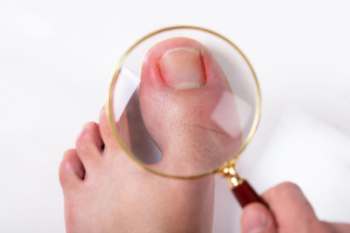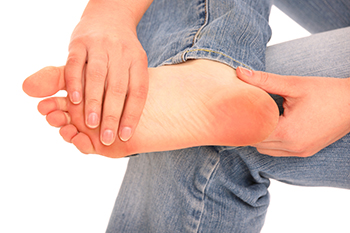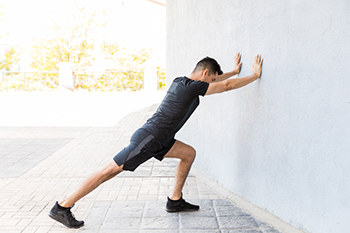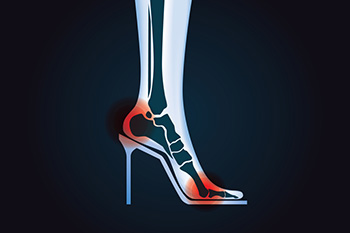Freehold (732) 294-9393
Freehold (732) 294-9393

Ingrown toenails occur when the edges of the toenail grow into the surrounding skin, causing pain and discomfort. This condition typically affects the big toe but can occur on any toe. Symptoms of ingrown toenails include redness, swelling, and tenderness around the affected area, with the potential for infection if left untreated. The primary causes include improper nail trimming, where nails are cut too short or rounded, wearing tight or ill-fitting shoes that press on the toes, and having naturally curved toenails. Other contributing factors can include trauma to the toe or genetic predisposition. To prevent ingrown toenails, it is important to trim nails straight across and wear well-fitting shoes that provide ample space for the toes. If you have symptoms of an ingrown toenail, it is suggested that you consult a podiatrist who can offer you the treatment that is best for you, which may include minor surgery for removal.
Ingrown toenails can become painful if they are not treated properly. For more information about ingrown toenails, contact Dr. Henry Miller of New Jersey. Our doctor can provide the care you need to keep you pain-free and on your feet.
Ingrown Toenails
Ingrown toenails occur when a toenail grows sideways into the bed of the nail, causing pain, swelling, and possibly infection.
Causes
Prevention
Because ingrown toenails are not something found outside of shoe-wearing cultures, going barefoot as often as possible will decrease the likeliness of developing ingrown toenails. Wearing proper fitting shoes and using proper cutting techniques will also help decrease your risk of developing ingrown toenails.
Treatment
Ingrown toenails are a very treatable foot condition. In minor cases, soaking the affected area in salt or antibacterial soaps will not only help with the ingrown nail itself, but also help prevent any infections from occurring. In more severe cases, surgery is an option. In either case, speaking to your podiatrist about this condition will help you get a better understanding of specific treatment options that are right for you.
If you have any questions please feel free to contact our office located in Freehold, NJ . We offer the newest diagnostic and treatment technologies for all your foot and ankle needs.

If you experience pain under your feet, incorporating specific exercises into your routine can help alleviate it, particularly if you have plantar fasciitis. Stretching and strengthening exercises focus on the plantar fascia, a thick connective tissue in the sole of the foot, and can be done without special equipment. For instance, one exercise involves sitting in a chair, placing the painful foot on your opposite thigh, and pulling your toes towards your shin to stretch the fascia. Another effective exercise requires standing near a wall, raising your toes against it while keeping your heel on the floor, and leaning forward to deepen the stretch. A third exercise involves getting on all fours with toes bent and sliding your bottom back towards your heels to stretch the fascia. While some exercises may cause mild discomfort, they are beneficial once acute pain subsides. A podiatrist can offer specific exercises according to your particular needs. If you have foot pain on the bottom of your feet, it is suggested that you schedule an appointment with a podiatrist for treatment.
Exercising your feet regularly with the proper foot wear is a great way to prevent injuries and build strength. If you have any concerns about your feet, contact Dr. Henry Miller from New Jersey. Our doctor can provide the care you need to keep you pain-free and on your feet.
Exercise for Your Feet
Exercise for your feet can help you gain strength, mobility and flexibility in your feet. They say that strengthening your feet can be just as rewarding as strengthening another part of the body. Your feet are very important, and we often forget about them in our daily tasks. But it is because of our feet that are we able to get going and do what we need to. For those of us fortunate enough to not have any foot problems, it is an important gesture to take care of them to ensure good health in the long run.
Some foot health exercises can include ankle pumps, tip-toeing, toe rises, lifting off the floor doing reps and sets, and flexing the toes. It is best to speak with Our doctor to determine an appropriate regimen for your needs. Everyone’s needs and bodies are different, and the activities required to maintain strength in the feet vary from individual to individual.
Once you get into a routine of doing regular exercise, you may notice a difference in your feet and how strong they may become.
If you have any questions please feel free to contact our office located in Freehold, NJ . We offer the newest diagnostic and treatment technologies for all your foot and ankle needs.

Safely stretching the Achilles tendon is essential for preventing injuries and improving flexibility. Begin with gentle stretches like the calf stretch, where you lean against a wall with one foot behind the other, keeping the back leg straight and heel on the ground. Hold the stretch for 15 to 30 seconds, then switch legs. It is important to avoid overstretching or sudden movements to prevent strain. Common Achilles tendon injuries include tendinitis, an inflammation causing pain and swelling, and Achilles tendon rupture, a severe tear resulting in sudden, intense pain and difficulty walking. Preventing these injuries involves warming up properly, gradually increasing activity intensity, and wearing supportive footwear. If you have sustained an Achilles tendon injury, it is suggested that you consult a podiatrist who can effectively treat this condition.
Achilles tendon injuries need immediate attention to avoid future complications. If you have any concerns, contact Dr. Henry Miller of New Jersey. Our doctor can provide the care you need to keep you pain-free and on your feet.
What Is the Achilles Tendon?
The Achilles tendon is a tendon that connects the lower leg muscles and calf to the heel of the foot. It is the strongest tendon in the human body and is essential for making movement possible. Because this tendon is such an integral part of the body, any injuries to it can create immense difficulties and should immediately be presented to a doctor.
What Are the Symptoms of an Achilles Tendon Injury?
There are various types of injuries that can affect the Achilles tendon. The two most common injuries are Achilles tendinitis and ruptures of the tendon.
Achilles Tendinitis Symptoms
Rupture Symptoms
Treatment and Prevention
Achilles tendon injuries are diagnosed by a thorough physical evaluation, which can include an MRI. Treatment involves rest, physical therapy, and in some cases, surgery. However, various preventative measures can be taken to avoid these injuries, such as:
If you have any questions please feel free to contact our office located in Freehold, NJ . We offer the newest diagnostic tools and technology to treat your foot and ankle needs.

High heels, while fashionable, can contribute to various foot deformities in women. Prolonged wearing of high heels alters the natural alignment of the foot, leading to conditions like bunions, where the big toe is angled inward towards the smaller toes. Hammertoes may develop, causing the toes to bend abnormally due to pressure and restricted space in narrow shoe designs. Additionally, high heels can worsen existing foot conditions, such as plantar fasciitis, contributing to chronic heel pain and inflammation. Achilles tendon shortening and calf muscle tightening are also common, affecting mobility and increasing the risk of injury. To decrease these risks, women can opt for lower-heeled shoes with adequate arch support and a roomy toe box. Regular stretching exercises and alternating heel heights can help maintain foot flexibility and may help reduce the likelihood of developing painful deformities. If you have developed foot pain as a result of wearing high heels, it is suggested that you schedule an appointment with a podiatrist who can offer effective relief remedies and guide you on more suitable shoes to wear.
High heels have a history of causing foot and ankle problems. If you have any concerns about your feet or ankles, contact Dr. Henry Miller from New Jersey. Our doctor can provide the care you need to keep you pain-free and on your feet.
Effects of High Heels on the Feet
High heels are popular shoes among women because of their many styles and societal appeal. Despite this, high heels can still cause many health problems if worn too frequently.
Which Parts of My Body Will Be Affected by High Heels?
What Kinds of Foot Problems Can Develop from Wearing High Heels?
How Can I Still Wear High Heels and Maintain Foot Health?
If you want to wear high heeled shoes, make sure that you are not wearing them every day, as this will help prevent long term physical problems. Try wearing thicker heels as opposed to stilettos to distribute weight more evenly across the feet. Always make sure you are wearing the proper shoes for the right occasion, such as sneakers for exercising. If you walk to work, try carrying your heels with you and changing into them once you arrive at work. Adding inserts to your heels can help cushion your feet and absorb shock. Full foot inserts or metatarsal pads are available.
If you have any questions please feel free to contact our office located in Freehold, NJ . We offer the newest diagnostic and treatment technologies for all your foot and ankle needs.